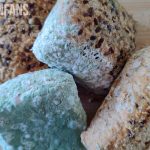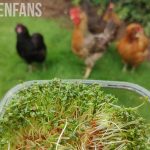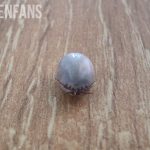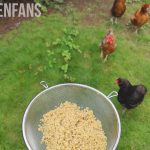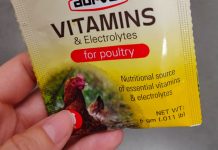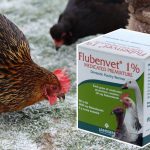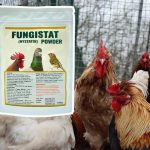Can Chickens Eat Grapes?
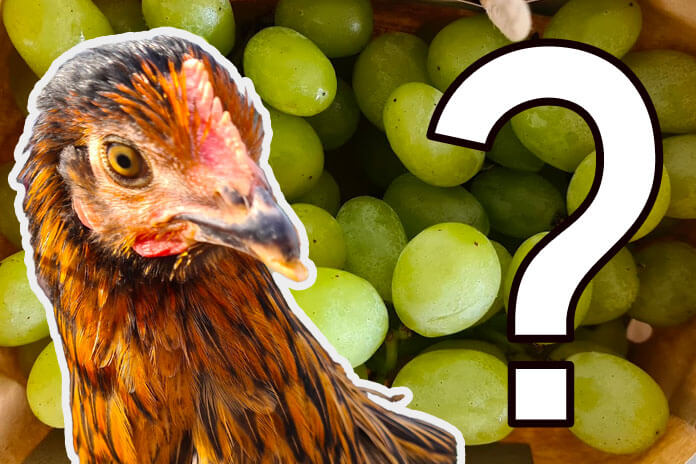
Grapes are generally considered safe for chickens. But they are highly toxic for dogs and cats. Should you be wary? Are grapes healthy after all?
Let’s take a look.
- Is it dangerous to feed grapes to chickens?
- Why are grapes poisonous to dogs and cats but not to chickens?
- Are grapes healthy for chickens?
- Can chickens eat grape seeds?
- Can chickens eat raisins?
- Summary: Can chickens eat grapes?
Is it dangerous to feed grapes to chickens?
It’s not considered dangerous to feed grapes to chickens. However, you might have heard people claiming the opposite. We’ve collected all the possible arguments to see what could make grapes so dangerous after all:
- grapes are toxic to dogs and cats so they must be for all small animals
- grapes contain mycotoxins that cause kidney failures
- grapes contain tartaric acid, which is toxic
- grapes are chemically treated with 50+ poisonous pesticides
- whole grapes can cause choking and death
- grapes contain sugar, which is bad for chickens
- grapes contain a natural alcohol percentage
That’s not a small list. Let’s go over these items and see if there is any truth in the arguments and debunk some myths.
Toxicity of Grapes
It is well-known that grapes, raisins, and currants are highly toxic to dogs and cats. This holds true for seedless or seeded grape variants, commercial or homegrown grapes, red or green grapes, and grape pressings from wine. Some dogs are extremely sensitive and will get really sick after eating a few grapes or raisins. In severe cases, this results in acute kidney failure and can be fatal to the dog.
Mycotoxins
At this moment, it’s still unclear why grapes are so toxic to dogs and cats.
For a long time, scientists suspected that mycotoxins were the root cause. Mycotoxins are toxic chemicals that are the by-product of fungi, yeasts, and molds growing on the grapes.
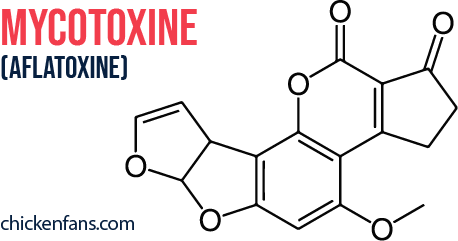
In chickens, some mycotoxins can cause ochratoxicosis, poisoning that causes yellow diarrhea. Mycotoxins are known to cause mycotoxicosis in poultry. However, scientists could not find any mycotoxins in the poisoned dogs.
Tartaric Acid
Recently, researchers are investigating the role of tartaric acid as the culprit of intoxication. Dogs and cats are sensitive to tartaric acid, and it’s one of the ingredients of grapes.
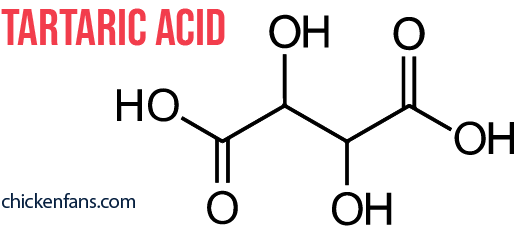
However, chickens have different metabolism and are not susceptible to tartaric acid. It’s rather the opposite. Researchers are investigating the benefits of adding tartaric acid supplementation to the diet of broiler chickens. Chickens grow faster on tartaric acid without any adverse side effects on their liver.
Pesticides
Of all fruits, grapes contain the most pesticide residues. In 2021, the Pesticide Action Network (PAN) published official figures and found 122 different pesticides in the 12 most polluted fruits. Grapes were leading the list in the UK, with 87.2% of all grapes containing pesticide residues. The USDA has published similar results in the US and found 56 different pesticide residues on grapes.
Half of the grapes contained imidacloprid, an insecticide derived from nicotine. It’s highly toxic to chickens and birds. In 2019, researchers from the Wildlife Investigations Laboratory in California reported the death of 26 American goldfinches due to eating seeds contaminated with imidacloprid during drenching. More than 1 in 10 of the grapes contained toxins like iprodione and pyrimethanil, which are slightly toxic to birds.
About 1% of grapes had highly toxic Chlorpyrifos residues. Chlorpyrifos is banned as an insecticide in poultry sheds since it kills a chicken’s immune system.
By now, it should be clear that you need to wash the grapes before feeding them to your chickens. If you have your own grapevines, you might revalidate the insecticides you are using.
Choking Danger
Most chickens peck at the grapes and tear them apart before eating them. However, they don’t have teeth, so they sometimes accidentally swallow a whole grape.
Most chickens love grapes and will fight for that one grape that you threw in the flock. During the fight, these kinds of accidents happen.
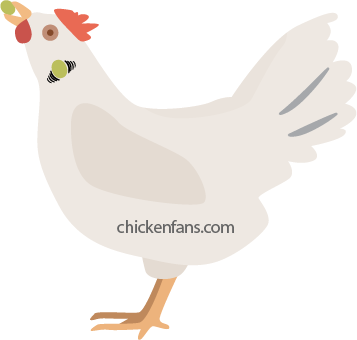
You don’t want to find your chickens choking on grapes, so it’s better to cut them in half before feeding them.
Sugar
Grapes are known for their high sugar content; 16% of a grape is sugar. That’s why people like it as a fruit and why people with diabetes need to watch out for grapes. Diabetes occurs in chickens too, but it’s not all that common.
That said, our backyard chickens can’t handle high sugar levels well. Although they don’t develop diabetes easily, they are insulin-resistant by nature, just like diabetics. Since the body cells of chickens are insulin-resistant, they don’t pull the excess sugar out of the bloodstream.
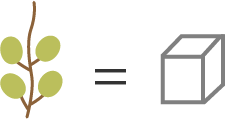
Naturally, chickens already have high levels of sugar in their blood. That’s by nature because chickens are energetic and continuously moving, so they always need some sugar. But providing them with tons of grapes is not doing them a favor. The high blood sugars will skyrocket. And with those elevated sugar levels in their blood, they can develop hyperglycemia.
It’s not that a chicken will die from eating a single grape, but moderation is key to avoiding excessive sugar in its bloodstream. Look at it as an occasional treat, but don’t include grapes in their daily diet.
The insulin resistance in chickens varies per breed. Silkie chickens have a stronger ability to regulate glucose than broiler chickens.
All table scraps that are high in sugar, like mango and pineapple, should be given to your chickens in moderation.
Sour Crop
Another problem with high sugar levels is that the sugar can disrupt the bacteria in the chicken crop. This disruption of the microflora can result in the rapid growth of Candida yeasts, a common fungus that’s also present in humans. Overgrowth can ultimately lead to sour crop, a common Candida-yeast infection that can be fatal for the chicken when left untreated.
Alcohol
Alcohol is toxic for chickens, and about 25ml of wine will kill a chicken. In Romania, dozens of starlings died after eating grape waste from the wine-making process.
Some people claim that any grape contains a low level of alcohol just by nature. Other people claim that natural grape juice can contain up to 0,5% of alcohol due to natural fermentation.
That’s not true. If you buy grapes or grape juice in the store, there is no alcohol present. The sugar in grapes only turns into alcohol after a fermentation process that includes yeasts.
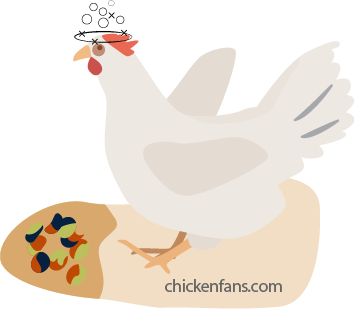
Damaged grapes that hang long enough and are contaminated with yeasts can start a natural fermentation process. So in rotten grapes, alcohol does accumulate. Even dogs can die from eating rotten apples. And you don’t want your chickens to die from alcohol intoxication.
Don’t feed your chickens with over-ripe, damaged grapes contaminated with yeasts and fermenting. And off course, never feed your pets any kind of alcohol like beer or wine.
Why are grapes poisonous to dogs and cats but not to chickens?
Grapes are highly toxic for cats and dogs. Sensitive dogs can get sick from a couple of grapes. They can develop acute kidney failure, causing urine production to stop, almost always fatal.
One report by the Animal Poison Control Center (APCC) of the American Society for the Prevention of Cruelty to Animals (ASPCA) states that 20 out of 43 dogs died after eating grapes or raisins.
But what about chickens?
Something toxic to cats and dogs is usually harmful to chickens too. For example, onions contain toxic sulfoxides that are toxic to dogs, cats, and chickens. Another example is rhubarb. Rhubarb has high levels of oxalates, which are harmful to dogs, cats, and chickens.
But for some reason, this logic does not apply to grapes. If grapes were as toxic for chickens as they are for cats and dogs, numerous flocks would have been wiped out. Chickens love grapes, and they will fight for a grape. So what’s the difference?
The truth is that nobody really knows for sure. Scientists have long been searching for why grapes are so toxic for dogs and cats. They used to think mycotoxins were the culprit. These are toxins that are the result of molds and yeasts growing on grapes. However, none of the abovementioned dogs actually ate some of those. And chickens are also susceptible to mycotoxicosis, so that would not explain the different outcomes between dogs, cats, and chickens.
Playdough and Tartaric Acid
In 2021, Dr. Wegenast, a veterinarian in clinical toxicology at the APCC, was investigating a case of a dog that got sick after eating Playdough. This is quite remarkable since Playdough is generally safe for children. While inspecting the Playdough recipe, they noticed high levels of tartaric acid. She quickly realized that’s also one of the unique and key ingredients of grapes. Dogs are known to be susceptible to tartaric acid, so the puzzle seems complete.
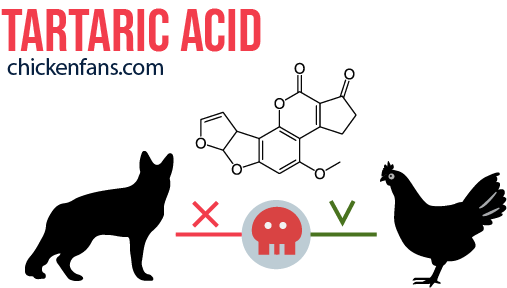
However, in 2022, scientists are still investigating and debating why cats and especially dogs are so susceptible to grapes compared to other species. Some researchers are looking at carnivore-related factors like the intolerance to tannins.
As it turns out, chickens benefit from tartaric acid supplementation. It has a positive effect on their gut flora and digestion. It turns out tartaric acid is heavily researched as a growth promoter in poultry. And tartaric acid doesn’t have negative side effects on their organs.
Are grapes healthy for chickens?
Apart from the sugar levels, grapes contain some healthy micronutrients for your chickens. They are fruit, after all.
They are a rich source of vitamin K and copper. Vitamin K helps against blood clotting, and copper is an essential mineral in energy production. It’s also a source of B vitamins like thiamine, riboflavin, and B6. These are essential vitamins for chicken growth and muscle building. Grapes also bring some amounts of vitamin C and E to the table.
| Copper | 21% DV |
| Vitamin K | 18% DV |
| Vitamin B1 (thiamine) | 9% DV |
| Vitamin B2 (riboflavin) | 8% DV |
| Vitamin B6 | 8% DV |
| Vitamin C | 5% DV |
| Vitamin E | 2% DV |
Most importantly, grapes are rich in powerful antioxidants. The chicken’s body needs antioxidants to fight free radicals, harmful substances that cause cancer, and other health conditions. Apart from vitamin c and beta carotene, it also contains resveratrol and quercetin. Two powerful antioxidants that help against heart disease and cancer.
That said, chickens don’t need these extra micronutrients on top of their regular daily food intake. Especially with the added sugars, grapes should be considered a sweet treat instead of a food supplement.
Can chickens eat grape seeds?
Yes, chickens can eat grape seeds. There are no toxins in grape seeds like in some other fruits. In fact, the highest concentration of antioxidants is found in the seeds. You can treat your chickens with any seedless or seeded grape variants.
Can chickens eat raisins?
Yes, chickens can eat raisins, but it’s not recommended. They contain 65% sugar, and store-bought raisins are processed with chemicals to aid drying. A lot of micronutrients are lost during this process.
Often, sulfur dioxide is used during processing, which is the same toxic chemical that makes onions so dangerous for chickens. You can remove the sulfur residues by washing the raisin and then placing them in lemon juice solution for a while. All very impractical, so we recommend against feeding your chickens raisins.
Technically raisins are just dried grapes, but practically they are a bad food source for chickens.
Let’s wrap up and go to our final summary.
Can chickens eat grapes?
Yes, chickens can eat grapes in moderation if you wash them thoroughly. Although grapes are toxic to dogs, they are fine for chickens. They contain some micronutrients but they are also very high in sugar, so consider it a treat. Cut them in half to prevent choking. Don’t feed raisins or rotten grapes.
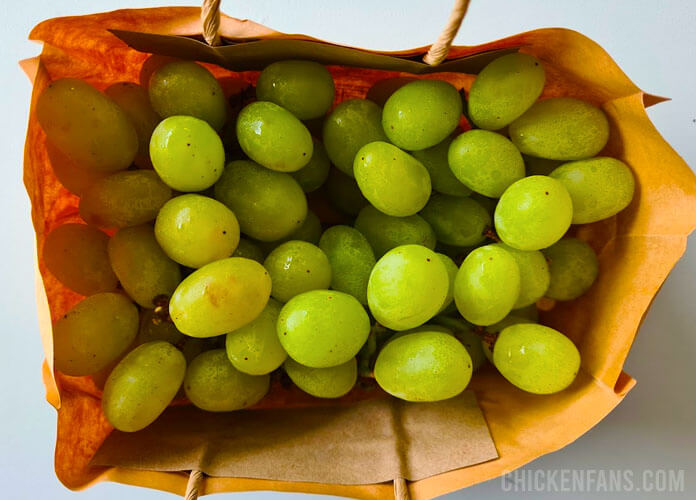
Related Questions
We’ve covered a lot but still received some questions, so we bundled them here.
Can chickens eat green grapes?
Yes, chickens can eat green grapes in moderation. Green grapes are not that different from other varieties in their composition. If you wash the grapes thoroughly and don’t overfeed them with sugary grapes, they are a healthy treat for chickens.
Can chickens eat red, blue, or purple grapes?
Yes, in moderation, chickens can eat dark-colored red, blue, purple, and black grapes. They contain higher concentrations of antioxidants like quercetin and resveratrol than green grapes. They even contain anthocyanins, which green grapes don’t have. Anthocyanins help with blood pressure and cholesterol. As long as you wash the grapes thoroughly and don’t overfeed them with sugary dark grapes, they are a healthy treat for chickens.
Can I give my chickens whole grapes?
You can feed chickens whole grapes; usually, they will peck at them, tear them apart, or crush them. But when every chicken in the flock is fighting for a single grape, they might swallow them at once in a hurry. Observe their behavior. If your chickens are not crushing the grapes before eating them, consider cutting them in half to be sure you don’t risk any incidents.
Further Read
We have some other interesting articles on food toxicity for chickens:
- Can Chickens Eat Onions? – an in-depth look into all the biochemical toxins in onions, including sulfoxides and other bioactive compounds, together with their impact on egg quality and egg-laying
- Can Chickens Eat Chocolate? – why chocolate is dangerous for chickens and if there is a difference between dark, milk and white chocolate
- Can Chickens Eat Rhubarb? – an in-depth look at rhubarb and its chemicals with examples of the toxicity levels of rhubarb and rhubarb leaves with the latest scientific insights
If you want to learn more about chicken feed, please consult our ‘Chicken Food Page‘ to go and see every specific food article we address. Including all articles on what chickens can and can not eat. Or go to our listicle food summary on ‘The Classroom‘.
